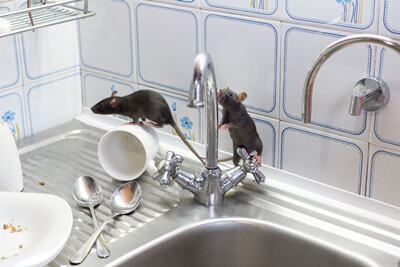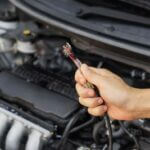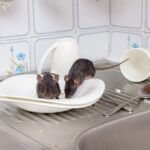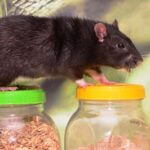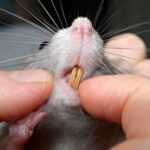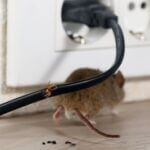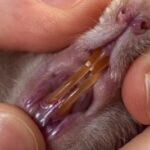Rats can cause significant damage to your home. They’re habitual gnawers, meaning they must constantly chew on objects and grind their teeth to keep them from growing too long.
Rats’ strong teeth and jaws can damage furniture, electrical cables, wires, clothes, fabrics, water, and plumbing pipes. They can contaminate your stored food and water with their droppings and urine.
Rats can fit into nearly any hole, meaning no part of the home is safe. While in your walls, rats can damage wiring, possibly leading to a house fire.
Even untraditional objects, such as metal and hard plastic, are unsafe because rats’ teeth have a Mohs scale rating higher than human teeth.
Can Rats Ruin Your House?
Besides being a health hazard and a general nuisance, rats can destroy your home.
Their curious, explorative nature means they’ll quickly enter all areas of a property. They’ll burrow holes to gain access, leaving pockets throughout your walls and foundations.
Here, water damage, pests, and mold can damage your home. Rats will also widen existing holes to improve their foraging routes, worsening existing damage.
Once inside, rats need to gnaw to keep their ever-growing teeth under control. As such, they will grind their teeth on any material they can find to keep their dental health in check.
Their teeth are tough enough to chew and grind through hard materials, including:
- Metal
- Wood
- Concrete
That makes rats a severe threat to the structural integrity of your home. Once these unwelcome guests explore your home, they’ll not hesitate to gnaw at your:
- Furniture
- Electrical appliances
- Clothes
- Books
- Water pipes
- Roofing and walling material
Over time, structural damage to your home can lead to other problems, such as leaking pipes and fire hazards.
According to Applied Network Science, up to 25% of unexplained house fires are credited to damage caused by rats. This means rats can cause permanent damage to your property in the short term and the long term.
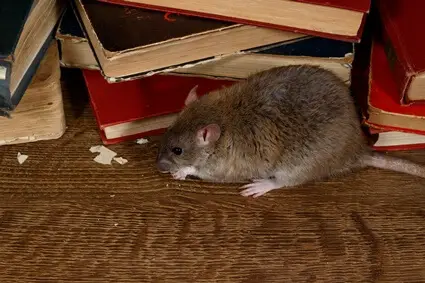
Damage Caused By Rats
Despite their small size, rats can be destructive to property. This is due to their habitual chewing, which motivates rats to gnaw at anything they can get their claws on.
This includes your valuables, structural features, and utility lines. Here are the main ways that rats damage your home and may cause you to suffer thousands of dollars in losses.
Chewing Electrical Wires and Cables
Electrical cables and wires are often the first casualties whenever rats infest a home. Rats are attracted to wires, and that’s because most wires are contained inside electrical appliances such as:
- Power generators
- Air conditioners
- Washing machines
These gadgets produce heat when operational, thus providing a warm environment for rats.
For this reason, rats sometimes prefer to nest inside or behind these appliances. Once inside, they can easily access any wiring and munch on the cords to sate their chewing habits.
The rounded shape of most electrical cables makes them easier for rats to hold onto when chewing. Considering how strong rat teeth are, the persistent gnawing of wires eventually causes the wires to split open or break. This is a recipe for disaster, as it can damage your cables’ insulation material, leaving the wires naked and exposed.
When this happens, your electrical gadgets are likely to malfunction. You may notice the light bulbs flickering on and off for no explanation. Likewise, your appliances could malfunction more often than they used to.
Fire Damage
The structural damage caused to electrical cables by rats is a severe fire hazard, and this can cause significant losses.
According to the National Fire Protection Association (NFPA), an estimated 20-25% of all house fires in the United States are caused by rats and other rodents.
Therefore, if you see rats around your home, you must take the necessary measures to protect your electrical appliances and systems—using rodent-resistant cable sleeves to fortify your wires against rats.
Damaging Water And Plumbing Pipes
Rats’ teeth are tough enough to chew some of the hardest metals. It’s hardly surprising that rats can cause untold damage to water hoses and plumbing pipes.
Rats sometimes nest near pipes since it gives them easy access to drinking water. Unfortunately, they often chew on the pipes and perforate them with their front teeth.
This can cause your pipes to leak and flood your home with water. Not only does this carry the risk of water damage to your property, but it can also cause your water bill to skyrocket.
Small leaks can cause just as much damage. Wooden structures can begin to break down, mold can flourish in unseen places, and other pests will draw near the water source the rats have created.
You can take measures to prevent rats from chewing your pipes. For instance, sealing any holes in your walls will keep rats out, thus ensuring they do not get access to the water pipes inside your home.
Damage To Insulation
Rats are most likely to hide in the attic. Rats prefer this location since it is warm, peaceful, and has little human traffic. That’s especially true for species of roof rats, which like to nest in high places.
Unfortunately, rats can damage your home insulation when nesting in the attic. This is done by tearing it into shreds and using it to build nests or nest inside it. Rats will rip apart your insulation, making it less effective.
To prevent this, you need to ensure that rats don’t get inside your attic in the first place. Doing so requires you to seal off all possible entry points, no matter how small they may seem.
After all, according to the University of Nebraska, rats can squeeze through any opening larger than ½ an inch. You must plug all holes around your wall to keep rodents out.
Make your home less appealing to rats. You can ensure garbage bins are covered, pet food is sealed, and all food is stored properly to prevent rats from accessing it.
Keeping nesting materials (such as books, newspapers, and old clothes) out of the attic is also wise.
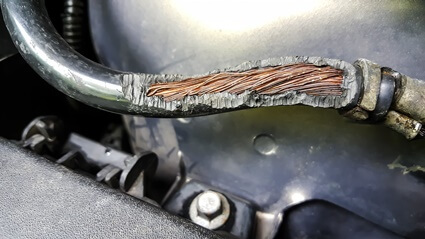
Boring Holes In Furniture
Rats’ teeth are strong and sharp enough to chew through furniture made of wood.
Allowing a rat infestation to fester can lead to thousands of dollars of furniture damage. Rats chew seats, cushions, and mattresses and urinate on them, causing the material to become damp and rotten.
You can do several things to prevent rats from nesting inside or under your furniture. For instance, setting rat traps enables you to catch them before they can cause any damage to your furniture.
Covering your furniture also gives it added protection against rats’ teeth.
Contaminating Food and Water
Unfortunately, leftovers can attract rats to your home and encourage them to set up nests in or near your kitchen. This makes it easier for them to access your food reserves.
Rats can contaminate your food with poop, urine, and saliva. The food becomes unsanitary if rats enter your pantry and other food storage locations.
Ensure that your food is sealed and safely stored away. Any pantry and kitchen cabinets must be locked when not used to keep out rats. Moreover, ensure your kitchen is less desirable for rats.
Rats can damage your home directly and indirectly. The gnawed-on furniture, books, and clothes will be annoying, but the wiring damage and burrowed holes in structural supports can threaten your home.

